Month 9:22, Week 3:7 (Shibi'i/Sukkot), Year:Day 5937:259 AM
Gregorian Calendar: Tuessday 24 December 2013
The Heart of Torah I
What Yah'shua Most Hates
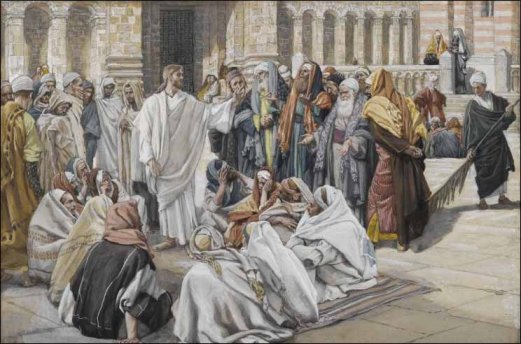
Introduction
Shabbat shalom kol beit Yisra'el and may the grace and blessings of our Master Yah'shua the Messiah (Jesus Christ) be upon you all. Today is a pagan high holiday, as you know, that is celebrated by both satanists and Romanist 'Christians' - by satanists and devil-worshippers who engage in demon revels tonight and by Romanist 'Christians' for whom it is Christmas Eve. We shall be ignoring it and especially praying for those who are lost. The winter equinox has passed, as will all this pagan nonsense over the next week, and I, for one, am looking forward to the spring festivals again!
Our Long Development
In the meantime the first stirrings of the awakening, long prophesied, has begun in East Africa, that is now occupying much of our attention. I think it has suprised our brethren there as much as it has us, and yet this is just the beginning. The suddenness of this move of the Ruach (Spirit) has forced me to dig deep into our materials and start updating them given that they cover a wide range of theological development going all the way back to the 1980's when we started. We have waded across many theological rivers in our time in our search for the source of the Besorah (Gospel), its fountainhead, its pristine beginnings, so there is great variety in our writings. It's really only in the last few years that we have been able to put everything together.
A New Task
With one of my sons now digging deep into Scripture himself and trying to find his footing in a very complex world, and coming as he does with many interesting questions from his unique perspective, and with our African brethren at the back of my mind with their diverse upbringing in Messianism and Protestantism, I feel led today to undertake a very difficult but necessary task indeed.
The Bible - Simple and Complicated
This Book in my hand - the Bible - is the most complicated and the most simple to understand at the same time. It baffles the greatest minds and delights the minds of children because of the the simplicity of its truths. We can both make it too complicated to understand by reading more into it that's actually there and we can oversimplify it by trimming away the things we don't like or which do not accord with our traditions. Someone coming fresh to this book, as well as those of us who have been immersed in it most of our lives, have two important things we must do before we can properly understand it:
- 1. We have to put each of the 66 books of both Testaments in their proper settings - that requires dedicated study; and
- 2. We have to make them applicable to our day and age by 'translating' them a second time into our situations by means of the Ruach haQodesh (Holy Spirit).
Suspended Between Torah and Ruach
The first of these exercises requires patient brain work and purification and the second requires diligent heart purification so that the Ruach (Spirit) can work freely in us. You can't choose one and exclude the other because either way you lend yourselves to deception. Like so many Besorah (Gospel) endeavours we cannot know the whole emet (truth) without stretching a line between two points and holding it taut. There must be tension between mind and heart operating in biblical tavnith (pattern). As I think the original science fiction series, Star Trek shows rather well, there has to be a connection and balance between Mr.Spock's logic and Captain Kirk's passion. Apart they do not do very well but as a team they do very well. Admittedly that's fiction but it does tell an emet (truth) - there has to be a union between male and female to create something beautiful.
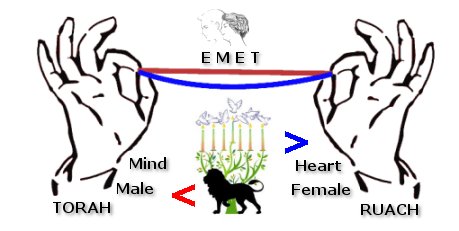
A Balance with Headship
Applying the Bible to personal living is not, as all the schisms in Christendom show, an easy matter unless you keep the line between literal emet written (truth) and the revelation that comes from a life in the Ruach (Spirit) that comes from spiritual rebirth or regeneration. It is never a matter of either/or but both/and. Messianics tend to over-emphasise the male Torah and Evangelicals the female Ruach (Spirit), and fail to understand that:
- 1. Head without heart is dead letter and worthless; and
- 2. The 'husband' (Torah) is the Head of the wife (the spiritual life or Ruach/Spirit).
The Perfect Marriage of Opposites
Torah alone is lifelessness whereas Ruach (Spirit) is emotional anarchy. Instead of warring against each other, Messianics and Evangelicals need a marriage, not of convenience, but of absolutely necessity.
Torah Settings
Teaching, learning and implementing Torah is not, however, as straightforward as you might suppose otherwise the Messianic Movement wouldn't be plagued with the same kind of splits as Evangelical Protestantism is. Before we can make the Torah applicable to a modern setting we have to first of all understand its original settings. I emphasise the 's' in 'settings' because there's more than one in the Bible. Enormous cultural changes took place in Israel over the millennia because of the influence of neighbouring pagan nations and longer or shorter periods of exile in them. This means that we cannot assume that the backgrounds of Adam, Abraham, David, Ezekiel and the apostles were the same. Not only that, but we today are worlds apart from them in our cultural settings - and again, I emphasise the 's' in 'settings'. There is a world of difference between the cultures of East Africa, a Western country like the USA or UK, India, China and Papua-New Guinea. And every one of them has a tendency to 'read' their own culture into the different cultural settings of Scripture.
We Need Good Historians
I have long thought that in addition to the congregational offices listed in the Messianic Scriptures (New Testament) that there shouldn't be one of Historian too. Or at least that there should be the office of a Teacher who specialises in history and culture. To properly understand the Scriptures means that, first of all, we have to be historians, which is why I lay such a strong emphasis on the importance of history in my home and in the ministry. This may be why the élites de-emphasise history because they know how important its perspective is in contrasting today's artificially-generated globalist culture with systems that might perhaps challenge it.
"Led by the Spirit"
A typical response to either those who don't like history or are too lazy to study it is to throw out such clichés as "all you need is the Ruach (Spirit)". They know perfectly well that this is an emet (truth) statement because the Scriptures everywhere testify that without the Ruach (Spirit) we are helpless both to live the Besorah (Gospel) as well as to interpret Scripture. However, the emet (truth) has to be told and it must be recognised that not everyone who claims to have the Ruach (Spirit) actually does, or at least not in the fullness. Go to every Christian and Messianic denomination you can find, with all their varied teachings and degrees of 'aliveness' (or spiritual death) and they will nearly all claim to be 'led by the Ruach (Spirit)'. Do you see the problem here? Saying "the Spirit told me this or that" or "I am doing right because I am led by the Spirit" or "I don't need the Law because I have the Spirit" not only spells trouble, and has spelled trouble historically, but ought to be setting off red lights in you.
Divorce Leads of Legalism and Anarchy
You can't divorce Torah from the Ruach (Spirit) and still claim to be married to the Emet (Truth)! You can't separate Torah from the Ruach (Spirit) and claim that you know Yahweh's complete and perfect will for your life. It's not possible! Experience in the real world where rules and instinct are needed to work in concert, where the 'law' and the 'spirit of the law' once separated lead to injustice, where science and art together make for social cohesion, tells you - or ought to tell you - that Torah without Ruach (Spirit), or Ruach (Spirit) without Torah, lead to legalism or anarchy, respectively. At the two ends of this spectrum today as perfect illustrations of the two extremes we have Ultra-Orthodox Judaism and the Evangelical Charismatic Movement. Between them is the entire spectrum of Messianic Judaism and Charismatic Evangelicism.
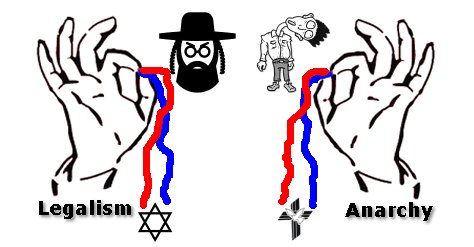
The Divine Pattern
This is ought to be common sense. It is common sense but we become blinded when we embrace lies of any sort. Can you see the obstacles that we face when we don't have Torah and Ruach (Spirit) in perfect tension, with Torah leading? It's the tavnith (pattern) of the divine marriage principle. It's everywhere in Scripture and we ignore it at our peril.
Paul in Corinth: An Illustration
You can't understand the Bible until you understand its unique settings. We not only have to get into the minds of the writers but we must get into the mindset or culture of those whom they were addressing. Let's take an example. Paul's first letter to the Corinthians is pretty much the Manual of Pentecostals and Charismatics. In it they find justification not only for their tongue-speaking but also their interpretation of all the other gifts like prophecy. However, the Corinthian situation was entirely different to Azuza Street in California in 1917 when the modern Pentecostal Movement was born! You can't understand 1 Corinthians without understanding Paul's background in the Israelite, Roman and Greek worlds or the cultural context of pagan Corinth [1]. What most Evangelicals don't realise, apart perhaps from the Baptists, is that the Corithian local assembly was the most immature, lawless and reprobate of all the congregations Paul wrote to! They were a constant source of trouble not only in Paul's day but also later in the post-apostolic era though they did at one time grow up and become stable only to fall once again. Studying the history of the Corinthian Assembly can be very instructive indeed.
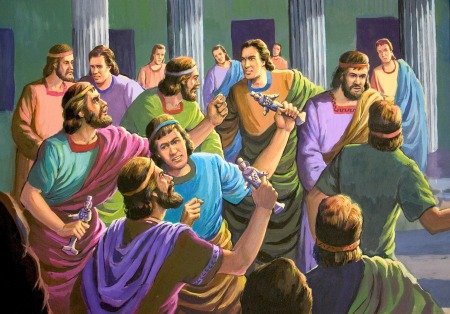 Chaos in the Corinthian Assembly: A Case of Charismatic Anarchy
Chaos in the Corinthian Assembly: A Case of Charismatic Anarchy
The Misunderstood Apostle Paul
I realise, and accept, that not everyone can be a proficient historian, but what I am absolutely saying is that there have to be competent historians somewhere in the Messianic Community who can bring balance and perspective into scriptural study. I think most theologians would agree that the apostle Paul is one of the most controversial of all the writers in the Bible and the reason for this, as Peter himself testified, is that he was the most misunderstood as Peter testified:
"Therefore, beloved, looking forward to these things, be diligent to be found by Him in shalom (peace), without spot and blameless; and account that the longsuffering of our Master is salvation -- as also our beloved brother Paul, according to the wisdom given to him, has written to you, as also in all his epistles, speaking in them of these things, in which are some things hard to understand, which untaught and unstable people twist to their own destruction, as they do also the rest of the Scriptures" (2 Peter 3:14-16, NKJV).
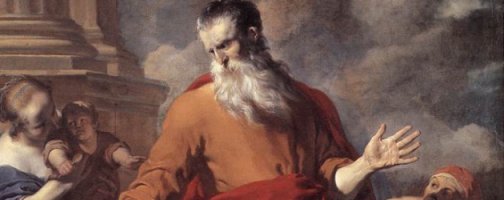 The Apostle Paul in a Roman setting
The Apostle Paul in a Roman setting
How Many Messianic and Christian Pauls are There?
If he was misunderstood and his words twisted then, how much more do you suppose he is misunderstood and his words twisted today?! [2] I think Paul would be horrified if he were to see how abused his writings have become. Looking at all the different denominations, from those Messianics who reject Paul outright and accuse him of being anti-Torah to those Protestants who set him up above the teachings of Messiah and the other apostles who praise him for being supposedly lawless, to those like ourselves who insist he was completely Torah-compliant, you would think - if all these positions were possible to glean from his writings - that the apostle suffered from psychological problems. And how many of these people who take these positions on Paul claim to have "the Spirit"? All, of course. However, there was and is only one Paul and you'll only understand him when you understand where he was coming from, to whom he was speaking, and what his goal was. I am a 100% supporter of Paul - I'm a Paulist through and through - but I place everything Yah'shua (Jesus) and the 12 apostles taught above him and interpret his writings out of what Messiah taught. Likewise, I interpret Messiah out of the Torah He Himself was submitted to, and which He taught, as the very Davar (Word) of His, and our, Heavenly Father.
The Importance of Scriptural Hierarchies
So to understand scriptures we have to have hierarchies or priorities. You can't understand the Messianic Scriptures (New Testament) without properly understanding the Tanakh (Old Testament). You can't understand Revelation without understanding Genesis. You can't understand the Gospels without understanding the Torah. You can't understand any of these without understanding their historial and cultural settings and the way the people from these times thought and acted. You have to see as they saw in order to be able to see for yourself. You can't superimpose British, American, Indian, Chinese or African culture on them and expect to come away with unadulterated emet (truth). I promise you, you'll get it very, very wrong and end up becoming your own private denomination if you do because each of us likewise reads in our own personal, incomplete and flawed experience and claim it's the "Spirit" tellings us we can eat ham sandwiches, roll around on the floor howling like a wolf, accusing Paul of being a heretic, exalting popes and rabbis, or whatever happens to be our fallen disposition in the moment.
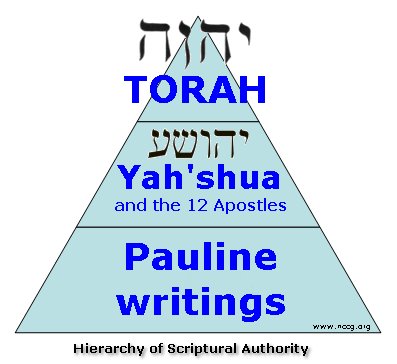
No, brethren and sisters, this isn't the 'Ruach haQodesh (Holy Spirit)' telling you these falsehoods, it your feelings that have as their source the FLESH and its unkosher desires.
Removing all the Pagan Clutter
Like a furnished house, our view of the world, of Scripture and of Elohim (God) is cluttered with every kind of furniture and decoration that was implanted there by our upbringing, school, television, the internet, peers and everything and everyone else we interact with. One of our tasks is to remove all this clutter and furnish our minds and hearts with the principles of emet (truth) that are revealed in the qodesh (holy, set-apart, sacred) Tabernacle (Temple) by understanding what they represent. This removal is symbolised in the second festival in Yahweh's Annual Calendar called Chag haMatzah or the Feast of Unleavened Bread. It's number #2 after Pesach (Passover) at which time we make a choice for the Lamb of Elohim (God), it lasts seven days (representing our whole life-span), and on its second day we observe the third festival known as Yom haBikkurim or the Day of Firstfruits which represents spiritual regeneration or being born again in Messiah Yah'shua (Jesus). Chag haMatzah, at which time we eat only unleavened bread or matzah, signifies the absolute need of getting sin our of our lives every day through careful Scripture study and repenting. It's a part of the process I am trying to talk to you about today.
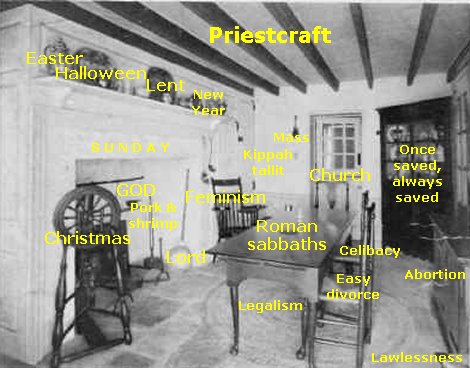 Some of the furniture clutter we have to get rid of
Some of the furniture clutter we have to get rid of
Springclean, Redecorate and Refurnish!
So, brethren and sisters, we are not only required to continually spring clean our minds and hearts but we have got to redecorate and refurnish every time we find error! We must not only remove the false (like Christmas) but we must put in the true (like Chag haMatzah). We are in the business of totally readjusting our lifestyle so that the Ruach haQodesh (Holy Spirit) has a vessel of emet (truth) to fill! If your vessel is Christmas, or speaking in gibberish, or observing a wrong Sabbath, how on earth can you expect the Ruach (Spirit) to 'fill' unclean vessels! The Ruach (Spirit) will depart and a false spirit from your flesh will take over and claim to be of Elohim (God)! Until believers understand what's required of them in Torah, they won't know how to fully receive the Ruach (Spirit) but minister from contrary spirits. They will have two minds and two hearts - of Yahwen and of the flesh - and be frustrated by the contradiction if they are honest enough to test them against Scripture. Otherwise, if they are not honest, Yahweh will maintain them in their delusion.
Distilling the Essentials
The Torah is a big thing so what I want to do for the remainder of this assembly is to extract what I believe to be the essentials for new believers and to remind old believers of our spiritual foundation. I am going to do that not by making a personal list but by going to the devarim (words) of Messiah Yah'shua (Jesus) Himself to see what He has to say about two areas of life which are of the utmost important:
- 1. His sayings about the worst things that a believer can be or do; and
- 2. His sayings about those things which make a believer blessed.
Inner and Outer Torah
While Old Covenant Torah mostly concerns itself with external behaviour, New Covenant Torah is mostly concerned about the righteousness within that ought to spontaneously result in external Old Covenant-type Torah-obedience. Yah'shua (Jesus) raises the 'holiness bar' and instructs us to be primarily concerned about what comes from within because that is where sin originates - in the mind (where it is conceived) and in the heart (where it is birthed) prior to its manifesting in external sinful action.
The Yardstick of Righteousness
It is a matter of some interest that the yardstick of righteousness used by Yah'shua (Jesus) isn't even mentioned in the Ten Commandments (Decalogue) even though it lies behind and at the heart of these Key Mitzvot (Commandments). What we're going to do now is examine the sins that Yah'shua (Jesus) spoke about, and hated, the most in His ministry. You'll be surprised to discover that not one of them is external is listed in the Decalogue. And that's because the heart of New Covenant Torah concerns what drives a man or woman in his or her behaviour.
Righteousness by Messiah
We are commanded in both Covenants to be righteous but it is important to understand that the only way we can be righteous is if we are "filled with the fruits of righteousness which are by Yah'shua the Messiah (Jesus Christ), to the glory and praise of Elohim (God)" (Phil 1:11, NKJV). Righteousness is not something we can ever earn or generate for ourselves but is always by the Messiah, and the glory is always for Yahweh the Father. Our righteousness therefore is not measured by how successfully we implement the external Torah but whether we appropriate it or not by emunah (faith, trusting). When we do, that righteousness will simply spill out of our hearts and into our deeds without our ever thinking about where it's coming from or whether we are ever going to be credited for it.
A. THE FIVE CHIEF SINS IDENTIFIED BY YAH'SHUA
Let's late a look at the five chief sins the Master highlighted throughout His ministry:
A1. Hypocrisy
To be a hypocrite is to give others the impression that we are holier than we actually are. It is the same as being false, or telling a lie. Yah'shua (Jesus) pronounced a curse on hypocrites seven times in one passage alone (Mt.23:13-29). But it is possible to tell a lie without even opening our mouths as Ananias did when he lied to the Ruach haQodesh (Holy Spirit) without saying a word - when he pretended to be a wholehearted talmid (disciple) of Yah'shua (Jesus) (Acts 5:1-5). We can lie just with the expression on our faces.
Yah'shua (Jesus) told the Pharisees that their inner life was "full of self indulgence" (Mt.23:25) because they lived only to please themselves. Yet they gave others the impression that because they knew the Scriptures well and fasted and prayed and tithed their income, they were very qadosh (holy). They appeared very pious externally. They prayed lengthy prayers in public, but they did not pray at length in private - just like many today. Yah'shua (Jesus) compared them to sewers. It is hypocrisy if we praise 'God' or 'G_d' only on Sunday or Saturday mornings, or even the true Elohim (God) on the correct calendar but do not have a spirit of praise in our hearts at all times. Yahweh looks at our hearts before He looks at external behaviour, though obviously He looks at both. The wise virgins had a hidden reserve of oil in their vessels while the foolish ones had only enough to light their lamps externally and have a good testimony before men (Mt.25:1-4). They appeared to be righteous on the outside but demonstrated they were not by what was lacking on the inside. When we hear of a Christian leader suddenly falling into adultery, we must realise that that was no sudden fall but the final result of a long period of unfaithfulness in his inner life. He was a hypocrite for too long! And like the other sins we shall be looking at, hypocrisy finally catches up with you as the inner is laid bare by actions that are no longer containable. The outer always adapts to, adjusts to, and finally equals the inner in the end.

A2. Spiritual Pride
Spiritual pride is the most common sin to be found among those who pursue holiness. We all know the parable of the self-righteous Pharisee who despised others even in his prayer (Lk.18:9-14)! It is more than likely that 90% of all prayers offered in public by believers are primarily meant to impress others who are listening and are not prayed to Yahweh at all. And sadly, ministers are no less guilty at times, particularly if they want to impress visitors. The Pharisee in the parable may not have been evil like other sinners in his external life but Yah'shua (Jesus) hated the kind of pride in which people view their spiritual activities as something 'better' or 'higher' than others. He hated it when people consciously compared their supposed righteousness with the righteousness of others because we are not even supposed to be self-conscious of our righeousness! It's supposed to be like breathing. It is spiritual pride that makes believers constantly judge other believers. It's what I call the 'sin of comparing' to make a person feel better about him- or herself. Our righteousness can only ever be compared to Messiah and to the standard set out in Torah.
The tax collector however, who saw himself as THE sinner - worse than all others - was accepted by Yahweh, was he not? All who have come face to face with Elohim (God) will have seen themselves at some time, as the chief of sinners. Paul certainly did. Yah'shua (Jesus) taught that the greatest person in heaven would be the humblest (Mt.18:4) because the greatest virtue found in heaven is humility. We see in the book of Revelation that all those who receive crowns in heaven are quick to cast them down before Yahweh acknowledging that He alone deserves every crown (Rev.4:10-11).
Yah'shua (Jesus) said that even if we managed to obey every single mitzvah (commandment) of Elohim (God), we would still be unprofitable servants who had not done anything more than what was expected of us:
"Does he thank that servant because he did the things that were commanded him? I think not. So likewise you, when you have done all those things which you are commanded, say, 'We are unprofitable servants. We have done what was our duty to do'" (Luke 17:9-10, NKJV).
Does that mean we should therefore not try to obey Torah, as many Evangelicals tell us? Of course not. The point here is that our obedience to the mitzvot (commandments) is a duty obligated upon all - they do not confer us with any rights, so there is nothing we need be 'proud' or boast of. Rather, we need to have the humility of the tax collector and recognising just how undeserving we are of any blessing.

A3. Impurity
Impurity enters into our hearts mainly through our eyes and our ears. This impurity then comes out from our hearts and expresses itself through the various members of our bodies - primarily through our tongues and our eyes. Anyone who seeks to be pure must therefore be especially careful about what he sees and what he hears, which means we must choose carefully the environments we, for example, find our entertainment in. Yah'shua (Jesus) hated impurity so much that He told His talmidim (disciples) that they should be willing to metaphorically pluck out their right eye and cut off their right hand rather than sin with those members (Mt.5:27-29). In other words, take drastic steps to avoid going into any kind of environment or situation that might elad you into temptation.
When do doctors recommend the amputation of the right hand or the surgical removal of an eye? Only when things have become so bad that without the removal of these organs, the whole body would die. This is what we need to understand in relation to sin as well. Sin is so serious that it can imperil our very life. Most believers have not realized this and that is why they are careless in the way they use their tongues and their eyes. We must be as blind men and as dumb men when tempted to sin with our eyes and our tongues. Once our minds and hearts are purified through overcoming then our outer actions will more readily and spontaneously conform to the acts of purity demanded of Yahweh's Torah and no longer require us to constantly wage war with the flesh.

A4. Indifference To Human Need
Yah'shua (Jesus) was angry when the leaders of the synagogue did not want Him to heal a man, just because it was the Sabbath day:
"He was deeply disturbed by their indifference to human need" (Mk.3:5, LB).
We are commanded to do good to all men, especially to the children of Elohim (God) (Gal.6:10). Yah'shua (Jesus) taught that those who did nothing to help their brothers who were in need of the basic necessities of life, would be cast out of His presence in the final day (Mt.25:41-46). We may not have the gift of healing to heal sick believers but we can all certainly visit those who are sick and encourage them or to support them financially if they cannot afford medical treatment. That's all Yah'shua (Jesus) asks of us.
The rich man went to hell because he did not care for his brother Lazarus, who was a fellow Jew and a fellow son of Abraham. The cohen (priest) and the Levite in the parable of the good Samaritan were exposed as hypocrites by Yah'shua (Jesus) because they did not show compassion on their fellow, brother Judahite who was lying on the roadside wounded. The Bible says that those who see their brothers in need and who are not moved to help them do not really have saving emunah (faith) (Jas.2:15-17). They are only deceiving themselves when they say that they are born again; they are not. Those who do not help their brothers in need cannot possibly have the love of Elohim (God) dwelling in their hearts (1 Jn.3:17). Yah'shua (Jesus) spoke out strongly on such matters because He hated the attitude that many religious people had who were concerned only with religious activities but not with helping their needy brothers.

A5. Unbelief
The four sins that we have already mentioned can easily be identified as sins by all believers. But when it comes to unbelief, almost all believers think of it, not as a sin but as a weakness. And therefore they don't learn to hate unbelief as they hate other sins.
But the Bible speaks of an unbelieving heart as an EVIL heart (Heb.3:12). Yah'shua (Jesus) rebuked His talmidim (disciples) seven times for unbelief (Mt.6:30; 8:26; 14:31; 16:8; 17:17-20; Mk.16:14; Lk.24:25). It seems that He almost never rebuked His talmidim (disciples) for anything else!!
Unbelief is an insult to Yahweh because it implies that Yahweh does not care or provide for His children as much as, for example, evil fathers on earth care and provide for their children.
There is also a counterfeit emunah (faith) being preached these days - the 'name it and claim it' movement - as a means of getting things from Yahweh. But that is not the emunah (faith) that Yah'shua (Jesus) preached. He wanted us to have emunah (faith) to live by in our daily life. Victory over depression, bad moods and discouragement can come only as we have emunah (faith) in a loving Father in heaven and in the wonderful promises He has given us in His Davar (Word).
Twice we read in Scripture of Yah'shua (Jesus) being amazed - once when he saw EMUNAH (FAITH) and once when He saw UNBELIEF!
"When Yah'shua (Jesus) heard [of the Roman Centurion's emunah (faith)], He marveled, and said to those who followed, 'Assuredly, I say to you, I have not found such great emunah (faith, trusting), not even in Israel!'" (Matt.8:10-11, NKJV).
"Then He went out from there and came to His own country, and His talmidim (disciples) followed Him. And when the Sabbath had come, He began to teach in the synagogue. And many hearing Him were astonished, saying, 'Where did this Man get these things? And what wisdom is this which is given to Him, that such mighty works are performed by His hands! Is this not the carpenter, the Son of Mary, and brother of James, Joses, Judas, and Simon? And are not His sisters here with us?' And they were offended at Him. But Yah'shua (Jesus) said to them, 'A prophet is not without honour except in his own country, among his own relatives, and in his own house.' Now He could do no mighty work there, except that He laid His hands on a few sick people and healed them. And He marveled because of their unbelief. Then He went about the villages in a circuit, teaching" (Mark 6:1-6, NKJV).
I want you to particularly notice the connection between unbelief and pride for what was the cause of the peoples' unbelief? They took offence! They were offended! Why? Because of the sin of comparison! They were offended because they weren't as righteous and pure as He was!
Yah'shua (Jesus) was excited whenever He saw emunah (faith) in people. And He was disappointed when He saw people unwilling to trust in a loving Father in Heaven.

What Should We Do Now that We Know?
Now that we have understood what Yah'shua (Jesus) hated the most - and note that it wasn't their failure to live the Torah externally first and foremost - it should be our aim to hate these five sins too. As we discover these sins in our lives, we must crucify them ruthlessly.
Many preachers read articles like this regularly only in order to get points for their sermons. Let me warn all such: Satan will tempt you to use this sermon just to get five points for a sermon! But what you need to do, first of all, is to hate these sins thoroughly in your own life. Then - and only then - you will be able to proclaim the Davar Elohim (Word of God) with authority. Otherwise you will only be a Pharisee like many other preachers in the world. So he who has ears to hear, let him hear!
Conclusion
Next week we shall conclude this study by looking that the nine things that Yah'shua (Jesus) most loves in true talmidim (disciples). Until then, may Yahweh bless your week ahead and make you fruitful in all you do for Him and the Kingdom. Amen.
Continued in Part 2
Endnotes
[1] As an example of what I mean, see my study on Corinthian women in Women in the New Testament Messianic Community: A Look at Female Ministerial Rôles
[2] We have no choice but to study Paul in depth if we are to understand him. The Evangelical interpretation has more or less had its way now for centuries, and much of the work is invaluable. I am a great fan of James S. Stewart (A Man in Christ) whose views I have more or less followed since 1989. But now we're getting invaluable Messianic perspectives (David H. Stern, Andrew G. Roth, Avi ben Mordechai, etc.) who are challening traditional conservative Evangelical views. The latest on the scene, and perhaps the leading Pauline scholar in our day with an astonishing breadth of knowledge, is the former Anglican Bishop of Durham, Nicholas T. Wright of the University of St.Andrews (Paul and the Faithfulness of God: Christian Origins and the Question of Good - 4 vols.), whose studies I am only now dipping into.
Acknowledgements
[1] Zac Poonen, Five Sins That Jesus Hated Most
Comments from Readers
[1] "About 3 or 4 weeks ago I prepared a little something for my children (and some of their friends) for Sabbath, using your article. I didn't change any of the contents, but I did download some images from Google so that they had pictures to colour in and that were more for children. We had such a wonderful discussion about this, the children really enjoyed it.
Well, it turns out they enjoyed it so much, and now they just want to know when I am going to tell them about what Yah'shua most loves. I know you must be extremely busy, but I really hope you can find the time to finish your article. I posted this lesson to a friend of mine who also home schools her 3 daughters, and they loved it too, so I have a lot of little ones who are eagerly awaiting the follow up of their lesson" (TCE, New Zealand, 29 January 2014)

| 

